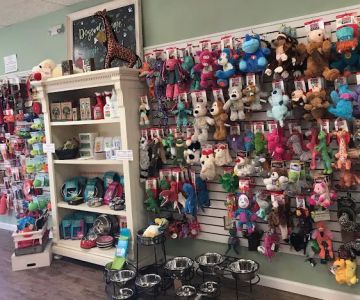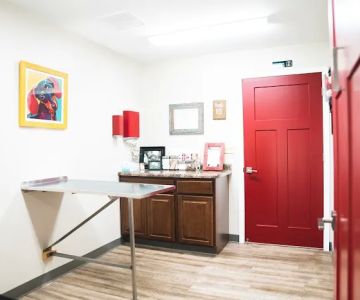Pet Health Check-Ups for Senior Animals in Raleigh: Keeping Your Older Pet Healthy
- Importance of Pet Health Check-Ups for Senior Animals
- Common Health Concerns for Senior Pets
- What to Expect During a Senior Pet Check-Up
- How Often Should Senior Pets Have Check-Ups?
- Real-Life Story of Senior Pet Care
- Why Choose Hidden Brook Veterinary for Your Senior Pet
Importance of Pet Health Check-Ups for Senior Animals
As pets age, their health needs change, and regular veterinary check-ups become even more important. Senior animals, like humans, can experience a variety of age-related health issues that may go unnoticed without professional attention. Routine health check-ups for senior pets are crucial for early detection of potential problems and maintaining their quality of life.
Regular check-ups help veterinarians detect early signs of conditions like arthritis, kidney disease, diabetes, and dental issues. These issues may not be immediately obvious to pet owners, but they can severely affect your pet's overall health. By addressing these concerns early, senior pets can receive treatment or management plans to improve their comfort and well-being.
Common Health Concerns for Senior Pets
As pets age, they may develop several common health issues that need attention. Understanding these conditions is crucial for pet owners to know what to look out for during routine check-ups and to ensure they’re providing the best care for their aging pets. Some common health concerns for senior pets include:
1. Arthritis and Mobility Issues
Arthritis is a common condition among senior pets, particularly dogs and cats. It causes joint pain, stiffness, and decreased mobility. Pets with arthritis may have trouble jumping, climbing stairs, or even walking comfortably. A veterinarian can assess your pet's mobility and recommend pain management options to improve their comfort and mobility.
2. Dental Problems
Dental issues such as periodontal disease are common in senior pets. Poor dental health can lead to tooth loss, gum infections, and even systemic health problems. Regular dental check-ups allow for early intervention to clean teeth and prevent infections that could impact your pet's overall health.
3. Kidney Disease
Kidney disease is another common condition in older pets, particularly cats. Symptoms may include increased thirst, changes in urination, and weight loss. Kidney disease can be managed if detected early, but without regular check-ups, it may progress unnoticed.
4. Diabetes
Diabetes is a serious health concern for senior pets, especially for dogs and cats that are overweight. Symptoms include excessive thirst, frequent urination, and weight loss despite a good appetite. Managing diabetes early can improve your pet's quality of life and prevent more severe complications.
What to Expect During a Senior Pet Check-Up
A senior pet check-up typically involves a thorough physical examination, blood work, and diagnostic testing to evaluate the pet’s overall health. Here’s what you can expect during a senior pet check-up:
1. Comprehensive Physical Exam
During the check-up, the veterinarian will conduct a full physical exam, checking your pet's weight, heart rate, respiration, and overall condition. The vet will also check for any signs of discomfort, pain, or changes in the pet’s behavior.
2. Blood Tests and Urine Analysis
Blood tests help evaluate organ function, hormone levels, and the presence of infections or diseases. Urine analysis can also help detect kidney problems, diabetes, and urinary tract infections. These tests are crucial for identifying underlying health issues before they become serious.
3. Dental Evaluation
Your pet’s dental health will be thoroughly examined to check for signs of periodontal disease or other dental problems. If necessary, a dental cleaning may be recommended to prevent further complications.
4. Joint and Mobility Assessment
If your senior pet shows signs of stiffness or discomfort, a joint and mobility assessment will be performed. The veterinarian will check for arthritis or other joint issues and may suggest treatment options such as medication, supplements, or physical therapy.
How Often Should Senior Pets Have Check-Ups?
Senior pets should generally have a check-up at least once every six months. As pets age, their health can change quickly, and regular veterinary visits are essential for identifying problems before they become more serious. For pets with specific health concerns, more frequent visits may be required to monitor their condition and adjust treatment plans.
During each check-up, the veterinarian will assess your pet’s physical health, behavior, and lifestyle to ensure they’re receiving the best possible care. Regular visits are key to maintaining your senior pet’s well-being and extending their quality of life.
Real-Life Story of Senior Pet Care
Meet Max, a 12-year-old Golden Retriever who had been showing signs of lethargy and difficulty walking. His owner, Sarah, brought him in for a senior pet check-up at Hidden Brook Veterinary in Raleigh. After a thorough exam, the veterinarian discovered that Max was suffering from early-stage arthritis and dental disease. With proper treatment, including pain management, joint supplements, and a dental cleaning, Max regained his energy and was able to move around more comfortably. This story highlights the importance of regular health check-ups for senior pets, as early intervention can greatly improve their quality of life.











